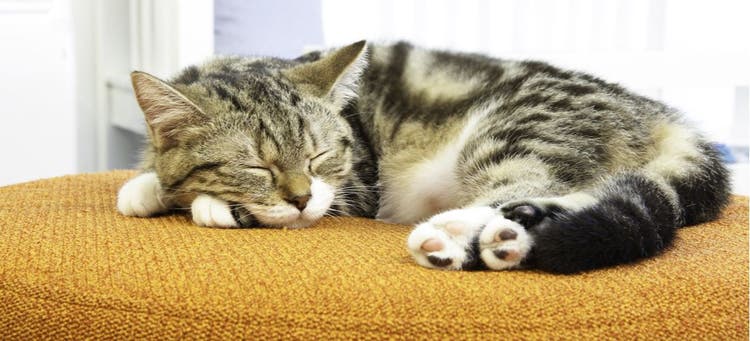
Why Do Cats Sleep So Much?
Even the most rambunctious, curious cats need a whole lot of sleep. On average, domestic felines doze for around 15 hours every day. Some cats, seniors and kittens in particular, catch as much as 20 hours of daily Zs.
Why Do Cats Sleep So Much?
Are cats really that sleepy? Are we boring them? Should we be concerned? In most instances, your cat’s packed sleep schedule is perfectly normal. Here are few of the reasons kittens, adults, and senior cats make plenty of time for sleep.
Catnaps: Slow-Wave Sleep
When you catch a glimpse of your sleeping cat, it probably looks like they’re immersed in a deep slumber. In reality, they’re most likely experiencing slow-wave sleep (often abbreviated SWS). About three quarters of your cat’s resting hours are spent in this near-waking state. They may look peaceful, but their senses are still active, preparing them to strike or pursue prey if necessary. True deep sleep (the type that results in rapid eye movement and dreaming) occurs just one quarter of the time. These deep-sleep periods tend to occur in five-minute increments between episodes of lighter SWS. Try to avoid waking cats while they’re enjoying slow-wave sleep. Alerting their senses and startling them awake could leave you vulnerable to swipes from their claws.
Predatory Instincts: The Wild Cat Within
Out in the wild, cats survive by hunting down small, agile prey. All that stalking, running, climbing, and pouncing can take a lot out of a cat. That’s why they’re accustomed to resting and recharging their batteries between hunts. All that daytime sleep helps ensure they’re energized and ready to go when it’s time to head out on the prowl. Though generations of domestication have helped produce the sedate housecats we know and love today, all that time hasn’t quite snuffed out all of their natural predatory instincts. Even the most pampered of felines can trace their tendencies back to wild ancestors.
Crepuscular Hunting: Not Quite Nocturnal
Wild cats rest during the day because they’re crepuscular hunters. They’re most active during the low-light hours at dawn and dusk when prey like birds and rodents are out and about. Don’t be shocked if your cat suddenly finds new reserves of energy once the sun starts to go down. Frenetic random activity periods (FRAPs, better known as “zoomies” or “midnight crazies”) see cats of all ages begin to exhibit strange behaviors at night. Cat owners can expect their pets to run throughout the house, jump, and climb whenever they’re afflicted with zoomies. Thankfully, cats are remarkably adaptable. With time, their sleeping and eating schedules will often evolve to suit their human housemates’ usual routines.
When Is a Sleepy Cat Cause for Concern?
Contact your veterinarian if you notice a marked change in your cat’s sleep patterns. Restlessness and excessive fatigue can both indicate underlying health concerns that demand veterinary intervention. Watch out for additional behavioral changes like skittishness and loss of appetite which may accompany changes in sleep pattern and could help your veterinarian arrive at a diagnosis more quickly.